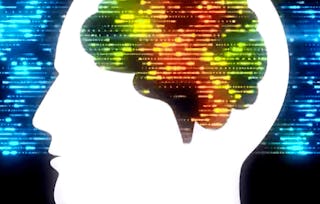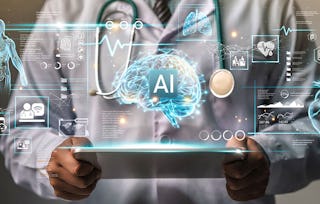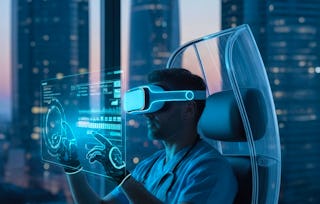The future of healthcare is becoming dependent on our ability to integrate Machine Learning and Artificial Intelligence into our organizations. But it is not enough to recognize the opportunities of AI; we as leaders in the healthcare industry have to first determine the best use for these applications ensuring that we focus our investment on solving problems that impact the bottom line.

Business Application of Machine Learning and Artificial Intelligence in Healthcare
Ends soon: Gain next-level skills with Coursera Plus for $199 (regularly $399). Save now.

Business Application of Machine Learning and Artificial Intelligence in Healthcare
This course is part of Healthcare Trends for Business Professionals Specialization

Instructor: Craig Johnson
8,242 already enrolled
Included with
(84 reviews)
What you'll learn
Determine the factors involved in decision support that can improve business performance across the provider/payer ecosystem
Identify opportunities for business applications in healthcare by applying journey mapping and pain point analysis in a real world context
Identify differences in methods and techniques in order to appropriately apply to pain points using case studies
Critically assess the opportunities to leverage decision support in adapting to trends in the industry
Skills you'll gain
Details to know

Add to your LinkedIn profile
See how employees at top companies are mastering in-demand skills

Build your subject-matter expertise
- Learn new concepts from industry experts
- Gain a foundational understanding of a subject or tool
- Develop job-relevant skills with hands-on projects
- Earn a shareable career certificate

There are 4 modules in this course
Rapid changes in technology are impacting every facet of modern society, and the healthcare industry is no exception. Navigating these changes is crucial, whether you are currently working in the industry, hoping to step into a new role, or are simply interested in how technology is being used in healthcare. No doubt you have heard the terms, “machine learning” and “artificial intelligence” more frequently in the last few years - but what does this mean for you, or the healthcare industry in general? Keeping up with the changing trends, examining the potential use of decision support, and identifying some of the pain points that can be addressed, are some of the topics we’ll be discussing in this Module.
What's included
15 videos4 readings6 assignments2 discussion prompts
Let’s navigate through what it takes to predict health outcomes and cost. What if we could use machine learning in your organization to reduce the cost of care for both the organization and the members receiving that care? Have you thought about what data you need to collect? How you might need to enrich that data to gain more insight in to what is driving those outcomes and cost? Or what types of machine learning algorithms you might utilize in order to most effectively target patients who are likely to be high cost? We are going to look at not only the tech behind the predictions, but also examine the business and data relationships within the healthcare industry that ultimately impact your ability to deliver an effective solution.
What's included
9 videos2 readings5 assignments1 peer review1 discussion prompt
Now that we have discussed various types of predictive models, let’s take a look at which models are appropriate for the business case we are trying to address and how we can evaluate their performance. For example, is using the same performance metric appropriate to use when making predictions about individual vs. population health? In this module we'll discuss how layering appropriate decision support methods on top of predictive analytics and machine learning can lay the groundwork for significant improvements in overall outreach and productivity, as well as decrease costs. Finally, we will discuss the key to blending decision support into the existing ecosystem of your business workflow and technology infrastructure.
What's included
9 videos1 reading6 assignments1 discussion prompt
Now that we know the importance of decision support and predictive modeling, we are going to take that one step further. Not only do we need to predict, but more importantly, we need to prescribe. It is not enough to just implement alerts and reminders - we need to offer guidance and recommendations for healthcare professionals. Let’s take a look at how analytics can improve the patient experience and their overall health status.
What's included
9 videos2 readings4 assignments1 peer review1 discussion prompt
Earn a career certificate
Add this credential to your LinkedIn profile, resume, or CV. Share it on social media and in your performance review.
Instructor

Offered by
Explore more from Business Strategy
 Status: Preview
Status: PreviewCleveland Clinic
 Status: Free Trial
Status: Free Trial Status: Free Trial
Status: Free Trial Status: Free Trial
Status: Free Trial
Why people choose Coursera for their career




Learner reviews
84 reviews
- 5 stars
61.90%
- 4 stars
27.38%
- 3 stars
3.57%
- 2 stars
1.19%
- 1 star
5.95%
Showing 3 of 84
Reviewed on Dec 16, 2020
Really informative for a beginner. A nice complement to my technology background.
Reviewed on Jul 9, 2020
Excellent course for technology professionals in Healthcare.
Reviewed on Aug 30, 2020
Solid course with an emphasis on the business uses rather than details of ML or AI.

Open new doors with Coursera Plus
Unlimited access to 10,000+ world-class courses, hands-on projects, and job-ready certificate programs - all included in your subscription
Advance your career with an online degree
Earn a degree from world-class universities - 100% online
Join over 3,400 global companies that choose Coursera for Business
Upskill your employees to excel in the digital economy
Frequently asked questions
To access the course materials, assignments and to earn a Certificate, you will need to purchase the Certificate experience when you enroll in a course. You can try a Free Trial instead, or apply for Financial Aid. The course may offer 'Full Course, No Certificate' instead. This option lets you see all course materials, submit required assessments, and get a final grade. This also means that you will not be able to purchase a Certificate experience.
When you enroll in the course, you get access to all of the courses in the Specialization, and you earn a certificate when you complete the work. Your electronic Certificate will be added to your Accomplishments page - from there, you can print your Certificate or add it to your LinkedIn profile.
Yes. In select learning programs, you can apply for financial aid or a scholarship if you can’t afford the enrollment fee. If fin aid or scholarship is available for your learning program selection, you’ll find a link to apply on the description page.
More questions
Financial aid available,
¹ Some assignments in this course are AI-graded. For these assignments, your data will be used in accordance with Coursera's Privacy Notice.

